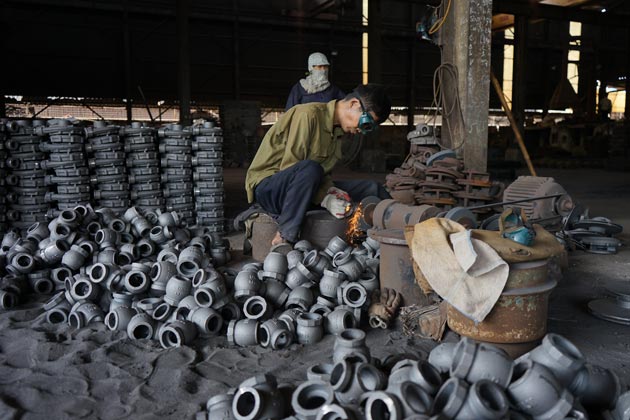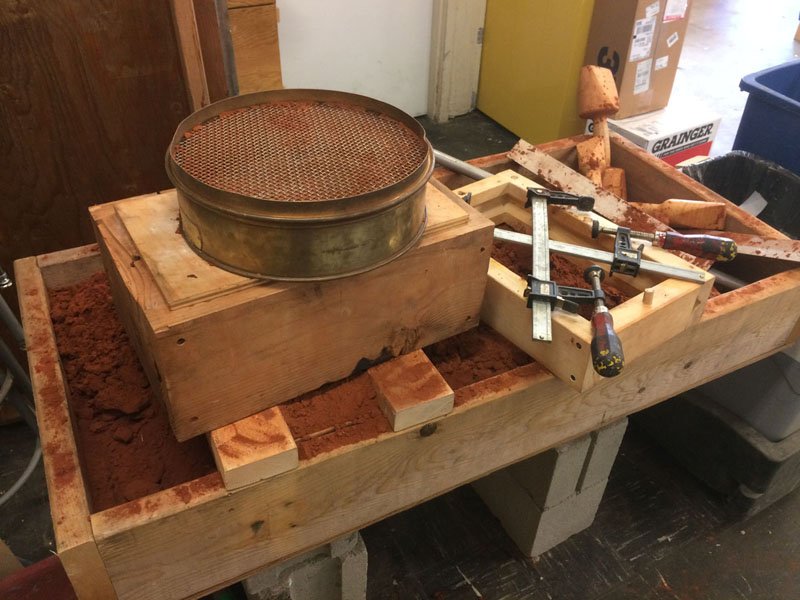Comprehending the Perks and Innovations in the Aluminum Foundry Sector
The Aluminum Foundry sector plays a vital function in contemporary production. Its light-weight residential or commercial properties especially improve gas efficiency, especially in vehicle and aerospace markets. On top of that, Aluminum's resistance to rust guarantees long life in numerous applications. As the sector advances, developments such as advanced recycling and additive production are reshaping manufacturing approaches. Discovering these improvements reveals not only the advantages but additionally the challenges in advance for Aluminum factories in a rapidly transforming market.
The Lightweight Advantage of Aluminum
Aluminum's lightweight nature offers significant benefits across different markets, especially in manufacturing and transport. Its low density enables the manufacturing of parts that are easier to mount and manage, resulting in lowered labor costs and boosted efficiency. In the vehicle industry, lighter lorries contribute to boosted gas economy and lower emissions, straightening with global sustainability objectives. Similarly, in aerospace, using Aluminum decreases the general weight of airplane, which is vital for boosting performance and decreasing operational costs.
Furthermore, Aluminum's light-weight homes promote innovative styles that were formerly unfeasible with larger products. This versatility enables suppliers to produce complicated forms and structures while preserving structural honesty. On the whole, the light-weight advantage of Aluminum not just boosts product performance yet likewise drives advancements in technology and layout, making it a favored product in various applications.
Rust Resistance and Sturdiness
The Aluminum Foundry market is renowned for generating materials with exceptional corrosion resistance, making them excellent for numerous applications. This residential property, integrated with boosted architectural stability, adds to the lasting performance benefits that Aluminum elements use. Consequently, markets increasingly rely upon Aluminum to satisfy requiring environmental problems without endangering high quality.
Superior Deterioration Resistance
While different steels encounter considerable obstacles from environmental aspects, Aluminum stands out for its superior corrosion resistance, making it a favored selection in several applications. This residential property is primarily because of an all-natural oxide layer that develops on the Aluminum surface area, offering an obstacle against moisture and corrosive agents. Unlike various other steels that might corrosion or weaken over time, Aluminum preserves its honesty even in rough environments, such as commercial settings or coastal locations. In addition, its light-weight nature incorporated with rust resistance makes it suitable for applications in aerospace, automobile, and aquatic markets. In general, Aluminum's exceptional sturdiness not just enhances product long life however also reduces upkeep costs, offering a compelling benefit for manufacturers and consumers alike.
Improved Architectural Stability
Developers and designers progressively acknowledge the value of boosted structural honesty in contemporary applications, where both corrosion resistance and durability are vital. Aluminum alloys, understood for their light-weight properties, likewise show outstanding resistance to rust, making them suitable for harsh atmospheres. The ingenious strategies employed in the Aluminum Foundry sector contribute significantly to creating elements with boosted toughness. Advanced casting procedures and alloy make-ups are customized to fulfill details performance needs, making sure that structures can hold up against severe problems without jeopardizing integrity. In addition, surface treatments and finishings boost the lifespan of Aluminum products, further mitigating degeneration in time. This concentrate on enhanced structural stability not just prolongs the use of materials however additionally lowers upkeep costs, solidifying Aluminum's setting as a material of choice in different markets.
Resilient Efficiency Conveniences
Lasting efficiency in Aluminum parts is mostly credited to their premium corrosion resistance and durability. Unlike several steels, Aluminum normally develops a protective oxide layer, which stops corrosion and damage in numerous atmospheres, consisting of industrial and aquatic settings. This fundamental building significantly expands the life expectancy of Aluminum items, decreasing upkeep and replacement costs. On top of that, the light-weight nature of Aluminum boosts its applicability throughout sectors without compromising strength. The product's resistance to use and tear additionally adds to its dependability popular applications, making it a suitable option for vehicle, aerospace, and construction fields. As markets significantly focus on sustainability and durability, Aluminum's performance advantages line up with contemporary engineering requirements, solidifying its role in cutting-edge production processes.
Ecological Effect and Sustainability
 As the Aluminum Foundry market progresses, it significantly prioritizes environmental impact and sustainability, acknowledging the requirement for liable practices when faced with environment modification. Efforts to lessen waste and energy consumption are at the leading edge, with many factories taking on reusing efforts to reclaim Aluminum scrap. This not only minimizes basic material use yet likewise especially lowers power expense, as recycled Aluminum needs only a fraction of the power contrasted to primary production.
As the Aluminum Foundry market progresses, it significantly prioritizes environmental impact and sustainability, acknowledging the requirement for liable practices when faced with environment modification. Efforts to lessen waste and energy consumption are at the leading edge, with many factories taking on reusing efforts to reclaim Aluminum scrap. This not only minimizes basic material use yet likewise especially lowers power expense, as recycled Aluminum needs only a fraction of the power contrasted to primary production.Innovations in discharges regulate modern technologies are being applied to lower air contaminants, lining up operations with stricter environmental guidelines. Shops are likewise checking out alternative energy sources, such as solar and wind, to power their facilities sustainably. By cultivating partnership with stakeholders, the market intends to create innovative services that enhance eco-friendly stewardship. Collectively, these efforts highlight a commitment to decreasing the Aluminum Foundry's carbon footprint while promoting a round economic situation within the production market.
Advanced Manufacturing Techniques
 Revolutionizing manufacturing processes, the Aluminum Foundry industry is progressively integrating advanced manufacturing methods to enhance effectiveness and precision. Techniques such as computer system numerical control (CNC) machining and additive manufacturing have actually arised as essential parts in enhancing manufacturing workflows. CNC machining permits for high-precision component construction, substantially minimizing material waste and manufacturing time. Meanwhile, additive production opens brand-new avenues for complicated geometries and light-weight styles that were formerly challenging to attain.
Revolutionizing manufacturing processes, the Aluminum Foundry industry is progressively integrating advanced manufacturing methods to enhance effectiveness and precision. Techniques such as computer system numerical control (CNC) machining and additive manufacturing have actually arised as essential parts in enhancing manufacturing workflows. CNC machining permits for high-precision component construction, substantially minimizing material waste and manufacturing time. Meanwhile, additive production opens brand-new avenues for complicated geometries and light-weight styles that were formerly challenging to attain.In addition, the deployment of automation and robotics in Aluminum shops improves procedures, decreases human error, and boosts worker security. These modern technologies help with a more receptive manufacturing setting, enabling producers to adjust rapidly to market demands. The assimilation of advanced simulation software better boosts the layout and screening phases, resulting in exceptional product high quality. Collectively, these methods not just enhance functional efficiency but also foster technology, placing the Aluminum Foundry market at the center of modern-day production.
Developments in Reusing Procedures
The Aluminum Foundry sector is not just progressing in producing methods but is likewise making significant strides in recycling procedures. Advancements are emerging to enhance the efficiency of reusing techniques, lowering energy consumption and boosting sustainability. Advanced arranging technologies, such as automatic optical sorting, allow the identification and splitting up of Aluminum from other materials with high precision. This results in a higher quality of recycled Aluminum, which is vital for preserving the honesty of the end products.
Additionally, closed-loop recycling systems are being executed, permitting producers to recycle Aluminum scrap within their very own production processes. This reduces waste and promotes a circular economic climate. Additionally, study right into new recycling methods, such as hydrometallurgical procedures, provides the capacity for recuperating Aluminum from complicated waste streams. These developments not only contribute to lowering the carbon footprint of the Aluminum Foundry sector but also boost its economic feasibility in a progressively environmentally mindful market.
Applications Across Different Industries
Various sectors are significantly recognizing the adaptability and benefits of Aluminum Foundry products, resulting in prevalent applications throughout industries such as auto, consumer, building, and aerospace items. In the automotive industry, Aluminum castings add to lightweight car designs, enhancing fuel effectiveness and efficiency. Aerospace producers use Aluminum elements for their strength-to-weight ratio, essential for aircraft frameworks and elements.
In building and construction, Aluminum is preferred for its resilience and resistance to deterioration, making it perfect for home window structures, roof, and structural why not try these out assistances. Durable goods additionally take advantage of Aluminum Foundry products, as seen in cookware, electronic devices, and packaging, where light-weight and recyclable products are important.
The adaptability of Aluminum Foundry methods enables elaborate designs and accurate requirements, catering to the diverse needs of these sectors. Consequently, Aluminum Foundry items are ending up being indispensable to contemporary manufacturing procedures throughout numerous industries.
Future Trends in Aluminum Foundries
As sectors proceed to develop, Aluminum factories discover this info here are poised to welcome a number of essential trends that assure to improve efficiency and sustainability. One prominent trend is the raising adoption of electronic innovations, consisting of automation and expert system, which simplify operations and improve quality assurance. In enhancement, the push in the direction of sustainable methods is leading foundries to purchase recycling innovations, substantially lowering waste and energy intake.
 One more arising trend is the use of advanced alloys and products, catering to the growing need for light-weight and resilient parts across various fields (Aluminum Foundry). Furthermore, the combination of additive production techniques is prepared for to transform part style, supplying personalization and reducing lead times
One more arising trend is the use of advanced alloys and products, catering to the growing need for light-weight and resilient parts across various fields (Aluminum Foundry). Furthermore, the combination of additive production techniques is prepared for to transform part style, supplying personalization and reducing lead timesCooperation with research institutions is also expected to drive technology, as shops look for to develop brand-new processes and materials. Aluminum Foundry. Collectively, these trends indicate a transformative future for the Aluminum Foundry industry, lining up with wider objectives of sustainability and performance
Regularly Asked Inquiries
What Are the Typical Costs Related To Aluminum Foundry Production?
The typical expenses linked with Aluminum Foundry manufacturing consist of basic materials, labor, energy, devices upkeep, and overhead expenses. These factors collectively influence the overall economic investment needed for efficient Aluminum casting procedures.
Just How Does Aluminum Compare to Other Metals in Strength?
Aluminum, while lighter than many steels, displays impressive strength-to-weight ratios. Compared to steel, Aluminum is much less solid but offers exceptional rust resistance, making it a positive option in applications where weight and toughness are crucial.
What Precaution Are in Place in Aluminum Foundries?
Precaution in Aluminum shops normally include compulsory personal protective tools, ventilation systems to regulate fumes, routine devices maintenance, training programs for staff members, and adherence to strict safety and security guidelines to lessen risks linked with molten steel handling.
Exactly How Is Quality Assurance Managed in Aluminum Spreading Processes?
Quality control in Aluminum spreading processes entails rigorous inspections at different phases, including raw product examination, procedure tracking, and last product testing. Methods such as analytical process control and non-destructive testing guarantee adherence to sector standards.
What Qualifications Are Necessary for Aluminum Foundry Vendors?
The significance of qualifications for Aluminum Foundry providers consists of ISO 9001 for quality administration, ISO 14001 for ecological administration, and industry-specific criteria like ASTM and SAE, ensuring compliance, safety, and reliability in producing procedures.
The Aluminum Foundry sector plays a vital function in modern production. The Aluminum Foundry sector is renowned for creating materials with premium rust resistance, making them suitable for different applications. Revolutionizing manufacturing procedures, the Aluminum Foundry sector is increasingly integrating sophisticated production techniques to improve effectiveness and reference precision. The Aluminum Foundry industry is not only progressing in making methods but is additionally making substantial strides in reusing procedures. As markets proceed to progress, Aluminum factories are poised to welcome numerous vital fads that assure to enhance effectiveness and sustainability.